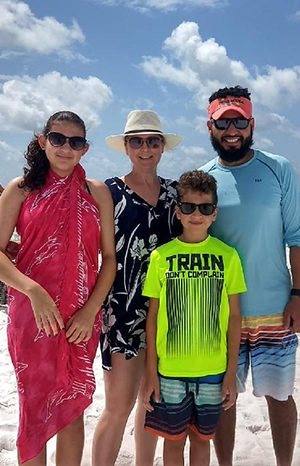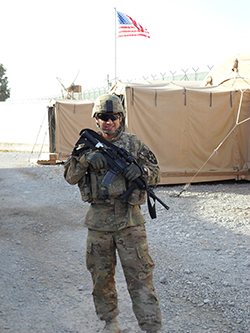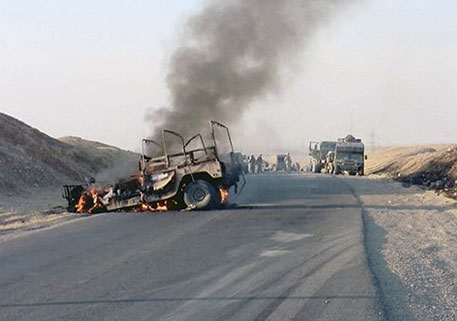
Growing up in Panama City, DAV benefits advocate Rafael Sierra dreamed of being a bus driver. He never envisioned serving as a combat medic in the U.S. Army.
DAV member Angel Gomez wanted to explore the world beyond the small town in Mexico where he was born. But he never could have imagined enlisting in the Marine Corps and driving Humvees across foreign landscapes or the explosion that would forever change his life.
Both were brought to the United States by mothers in search of more opportunities for their children. And both are among the many immigrants who have come to this country and volunteered to defend it. Since 2002, nearly 150,000 immigrants have become citizens through their military service.
As a 12-year-old, Sierra was devastated to leave his close-knit neighborhood on Calle Quinta for a new life in Miami. In his first few days in America, he realized he was missing something else: the simplicity of his birthplace.
“I would get home, hang up my [school] uniform, … and then all I had to do was put on some shorts and run out the door—no shoes, no shirt, nothing else—and no one would even bat an eye,” Sierra said.
“It was just a way of life.”
Gomez also remembers the culture shock of moving from Mexico to Farmersville, California, when he was 8. Like Sierra, Gomez didn’t speak the language of his new home, so he took English-speaking classes between regular third grade instruction.
Fourth grade brought a milestone when he was asked to read aloud from a book in English. Gomez did so well he was able to proceed without additional language lessons that year.
“But I still had an accent,” he said. “Like, really harsh. Some of the words would come out wrong, so it just took a little bit more time.”
By the time Sierra and Gomez reached the end of high school, another life-changing transition was on the horizon.

Dedication and sacrifice
For 19-year-old Sierra, the Army was an opportunity to learn a skill he could use to continue to provide for his family, as he had always done.
What began as a four-year enlistment in 1993 turned into a 24-year career, in large part because of the camaraderie Sierra found among soldiers. During that time, he served as a combat medic in Iraq and Afghanistan, led hundreds of other medics through training, met and married an Army nurse, had two children and traveled the world.
“I’m very grateful to be where I’m at and be able to do what I’ve done for this beautiful country,” Sierra said.
Soon after enlisting in the Marine Corps, Gomez knew he wanted to be a “lifer,” too. By 18, he was in Iraq. On his second deployment in March 2005, the war zone already felt “like normal,” but that deployment would be anything but.
One pitch-black night, Gomez and his unit headed out beyond the wire on a mission. Gomez was driving, as he had many times before.
A few minutes in, a nearby improvised explosive device went off, hurtling a piece of shrapnel into Gomez’s head.
“I was dazed,” Gomez said, “covered in blood.”
He remembers being bandaged and put in a Humvee. Two weeks later, he woke up in a hospital in Germany.
Gomez couldn’t feel the right side of his body, and a portion of his skull had been removed due to brain swelling.
“I was there, in my mind, but I just couldn’t talk, I couldn’t do anything,” he said. “I felt trapped.”
A path to citizenship
After stabilizing at Walter Reed Army Medical Center, Gomez was transferred to the VA Palo Alto Polytrauma Rehabilitation Center in his adopted home state of California. Staff there learned he wasn’t a U.S. citizen and set out to change that.
In July 2005, Gomez sat in a wheelchair, wearing a helmet and dress blues, and raised his left hand to take the oath of allegiance to the United States.
“I didn’t feel excited,” Gomez admitted. “My life had just changed drastically a couple of months ago, and so I was still trying to process that.”
It took years for Gomez to recover. He still can’t use his right arm and wears a brace on his leg, but he lives a fully independent life. In 2007, he participated in his first National Disabled Veterans Winter Sports Clinic, an annual adaptive sporting event co-presented by DAV and the Department of Veterans Affairs.
While U.S. citizenship was never top of mind, Gomez now has an appreciation for the hallmarks of being an American, such as registering to vote and being called for jury duty.
“It’s pretty awesome,” he said.
Six years into Sierra’s enlistment, a letter notified him that he was eligible for citizenship. Soon after, he took the oath.
“I was truly honored to be able to do that,” Sierra said.
He immediately sent the certificate of citizenship to his mom, realizing the dream she had when her family left Panama all those years ago.
“She was super excited and happy and proud of me,” he recalled.
In 2018, Sierra retired from the Army. He’s now dedicated to helping fellow veterans through his work at DAV.
“In very many ways, I felt like the U.S. had provided for me, and I still feel the same way,” he said. “I do what I do now, as a DAV national service officer, because I feel like I want to continue to give back.”
“So many of our members and service officers have realized the dream of citizenship through their service,” said National Commander Joe Parsetich. “The fact that people are willing to come here and put their lives on the line just for the opportunity to have a better life—that’s something we should not just be grateful for, but enormously proud of as well.”






